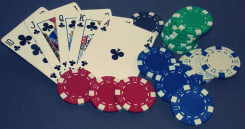When you hear the word “addiction,” what comes to mind? A line of cocaine? The clinking sound of empty beer bottles? What about a deck of cards?
Many are surprised to learn that behavioral addictions, such as an addiction to gambling, can be just as destructive as addictions to drugs or alcohol.
Read on to learn more about the dangers of gambling addiction and how you can seek help for yourself or a loved one.
What is gambling addiction?
A gambling addiction occurs when an individual cannot control the impulse to gamble, even when gambling continues to wreak havoc on his or her life and relationships.
Some problem gamblers begin gambling out of financial desperation. At the end of their rope, they see gambling as one last opportunity to get the money they need—and fast. As they gamble and lose the little money they have left, the stakes are higher, and they continue to gamble as a way to grasp at what they’ve lost and recover what they need.
Not all problem gambling is born out of financial desperation, however. Some find the emotional high they experience in the face of risk to be addictive. They continue to gamble more and more to experience that rush of adrenaline. Over time, they’re trading in a pile of gambling chips for a mountain of negative consequences.
Although gambling addictions don’t receive as much media attention as drugs and alcohol, the problem is surprisingly common. In fact, researchers at the University of Buffalo found that problem gambling is considerably more common than alcohol dependency in the United States. They reported that as many as 750,000 people between the ages of 14 and 21 have a gambling addiction, and 3-5% of all Americans struggle with a gambling problem.

Gambling addiction affects more than just the gambler: spouses, parents, children, friends and loved ones suffer too. What are the signs of problem gambling?
More infoWhat are the signs of gambling addiction?
If you’re wondering whether your gambling classifies as an addiction, try asking yourself the following questions:
- Do you hide your gambling activity from friends and family who have
expressed concern? - Have you ever gambled the money you needed to put towards living expenses or bills?
- Have you made unsuccessful attempts to quit gambling?
- Does the idea of quitting make you feel nervous or angry?
- Have you ever turned to gamble to help you manage anxiety, depression, or suicidal thoughts?
- Has your gambling caused financial strain, legal problems, job loss, or stress in your relationships?
- Have you increased the amount or frequency you gamble to experience
the excitement or high you felt in the beginning?
If you answered yes to one or more of the questions above, you may be struggling with problem gambling or gambling addiction.
What are the dangers of gambling addiction?
Although gambling doesn’t have the same physical effects as drug or alcohol abuse, the dangers of addiction are very real. In many cases, problem gambling is a sign of another underlying struggle or addiction.
For example, the researchers at the University of Buffalo found that alcohol abusers are 23x more likely to have a gambling problem than those who don’t abuse alcohol. Problem gamblers may also develop a dependency on drugs or alcohol to manage the stress caused by their increasing financial troubles.
Problem gambling may also be a sign of anxiety and depression. Some gamble in response to the strain of pre-existing anxiety or depression, while others may develop anxiety or depression as a consequence of their gambling addiction. These mental health struggles can put an individual at a higher risk of substance abuse, suicidal tendencies, and physical symptoms such as headaches or muscle aches.
Even if you don’t develop anxiety and depression or turn to substance abuse as a result of your gambling behavior, addiction can still wreak havoc on your life. Gambling addicts often face severe financial hardship, legal problems, loss of jobs, and stress within their relationships.

Learn more about gambling addiction, also called gambling disorder, which affects millions of Americans but is still somewhat misunderstood by many.
More infoHow should gambling addiction be treated?
First, it is important to understand that there is no shame in seeking professional help for gambling addiction. Gambling addiction happens to people of all intelligence levels, socioeconomic statuses, and backgrounds.
Getting help is a sign of your strength, not weakness.
For many problem gamblers, inpatient therapy is the best way to access support and accountability in the short-term, while also being equipped with tools for long-term success.
Cognitive Behavioral Therapy (CBT) is one technique that has proven to be successful in treating gambling addictions. This technique helps gambling addicts identify and replace the unhealthy beliefs and thoughts that drive their harmful behavior.
Dual diagnosis is another helpful tool in treating gambling addiction, as it allows therapists to identify and address co-existing disorders, such as depression, anxiety, and substance abuse.
Hawaiian Island Recovery uses CBT, dual diagnosis, and other therapies to help problem gamblers achieve lasting freedom from their behavioral addiction.
Call HIR Today
Hawaiian Island Recovery’s programs are highly effective in treating behavioral addictions, including an addiction to gambling.
If you or a loved one is struggling with an addiction to gambling, please call us today at (866) 390-5070.
 Hawaii Island Recovery
Hawaii Island Recovery 










